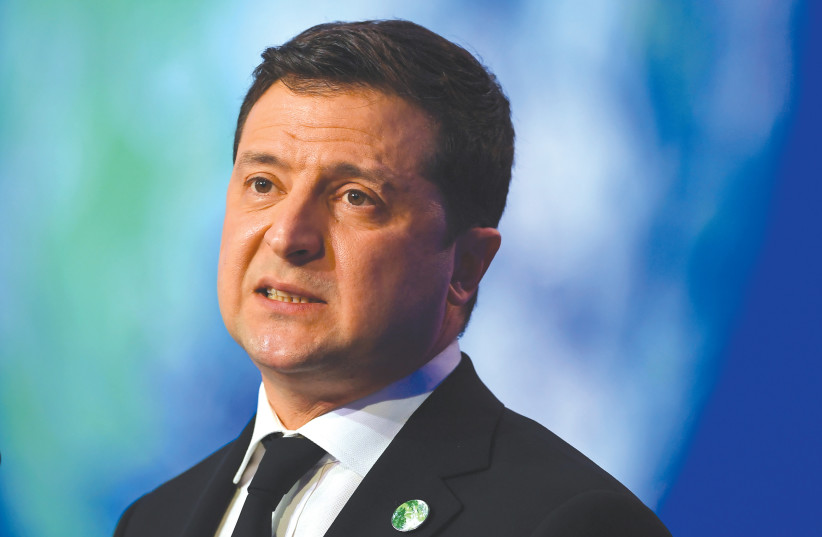BERLIN – The management of the 73rd Berlinale, the Berlin International Film Festival, is making sure that the suffering and tragedy caused by Russia’s war against Ukraine is marked at the festival in many ways, not least by showcasing actor/director Sean Penn’s new documentary, Superpower, which premiered on February 17.
Penn is attending the festival to promote Superpower, a portrait of Ukrainian President Volodymyr Zelensky. The president addressed the opening-night ceremony via a live video message in which he discussed and praised the power of cinema to change the world. He thanked the Berlinale for creating a badge and poster for the festival with the golden bear in yellow against a blue background, the colors of the Ukrainian flag.
“Your support in this is important and invaluable to us. Now there are thousands of kilometers between us, but we are side by side. We speak different languages, but there is complete understanding between us. Only a virtual border separates us, but there is no wall between us,” he said in the video.
“Your support in this is important and invaluable to us. Now there are thousands of kilometers between us, but we are side by side. We speak different languages, but there is complete understanding between us. Only a virtual border separates us, but there is no wall between us.”
Sean Penn
The festival features a special program about the war, as well as one about the repression of dissidents, among them many filmmakers, in Iran.
Filming Volodymyr Zelensky in Ukraine amid the war
Zelensky, a Jewish comedian/actor who played a history teacher on a TV series who was unexpectedly elected president before actually becoming Ukraine’s leader, sparked Penn’s interest even before the war began.

Penn was in Kyiv to interview him when the war broke out in February 2022. While many feared (and said) a year ago that Zelensky was out of his depth when confronted with Russia’s military force, and was unfit to lead the country during wartime, he has since proved himself to be as tough as he is charismatic. Penn’s decision to make a film about him seems prescient.
Superpower details Penn’s three visits to the country and includes several wartime interviews with Zelensky, conducted in undisclosed locations throughout Ukraine. Zelensky’s charm shines through in these interviews, as does his fierce determination to win the fight for his country’s independence.
The documentary makes it clear that his skill as an actor and comedy writer has served him well in the fight, and naturally, Penn references his most famous quote, which he reportedly said to the US when they offered him asylum, “The fight is here. I need ammunition, not a ride.”
“The fight is here. I need ammunition, not a ride.”
Volodymyr Zelensky (reportedly)
Penn is in awe of his subject and has great affection for him – the title of the film makes that clear – and it is praiseworthy that Penn has used his celebrity and connections to get this movie made and shown.
A decision was clearly made to put Penn front and center throughout the film, which may help this movie find an audience around the world – I hope it does – but the decision to focus on the actor/director and his crew can become annoying at times. As missiles rain down on Ukraine causing incalculable loss and destruction, it’s hard to care about whether they make it back to their hotel, especially when you already know they did.
Superpower includes a recap of the war’s events and it is powerful to see this footage and images on the big screen, including gruesome photos that need to be seen for the public to understand the gravity of the situation but are usually not shown on television.
The power of these images, when juxtaposed with many shots of the star-director giving his opinions about the war, will make you wish for more news clips and less Penn. Penn is a very talented director, and a number of movies he made are wonderful, among them Into the Wild, but here it seems he was under pressure to get the movie finished quickly, which may have affected his judgment about how he would come off.
The movie includes some background on the conflict along the Ukraine-Russia border, but it could have used more detail about Ukrainian history, especially considering that it seems to have been targeted at an audience of Americans who don’t follow the news and who may not even remember when the Berlin Wall fell or other basic facts that are relevant to Ukrainian history.
In spite of Superpower’s flaws, it is an effective portrait of Zelensky and a chronicle of the ongoing war. I hope Penn’s efforts in getting it shown around the world will be successful.
